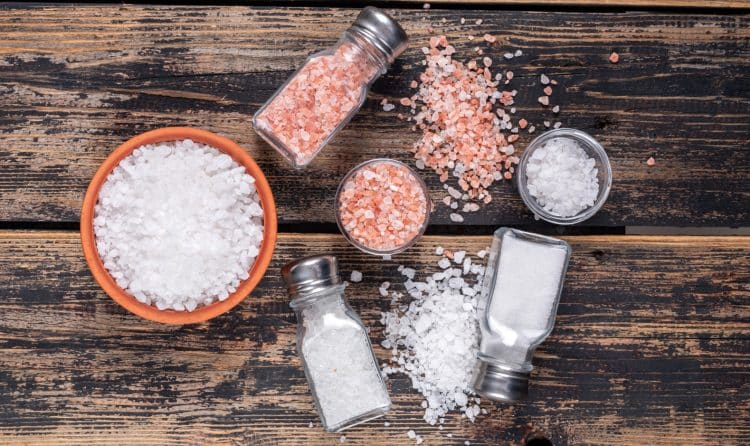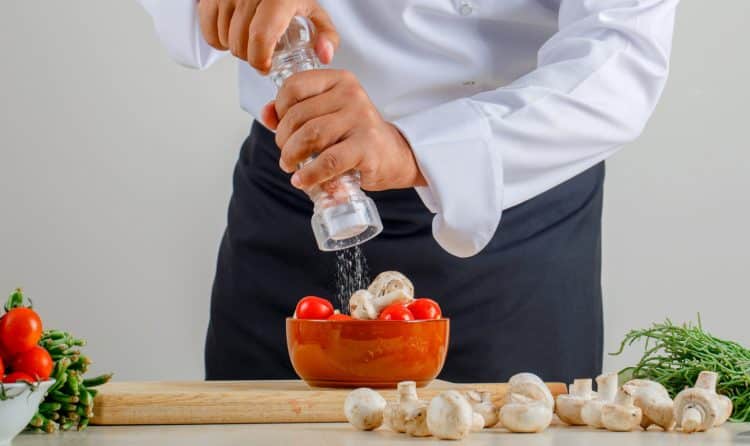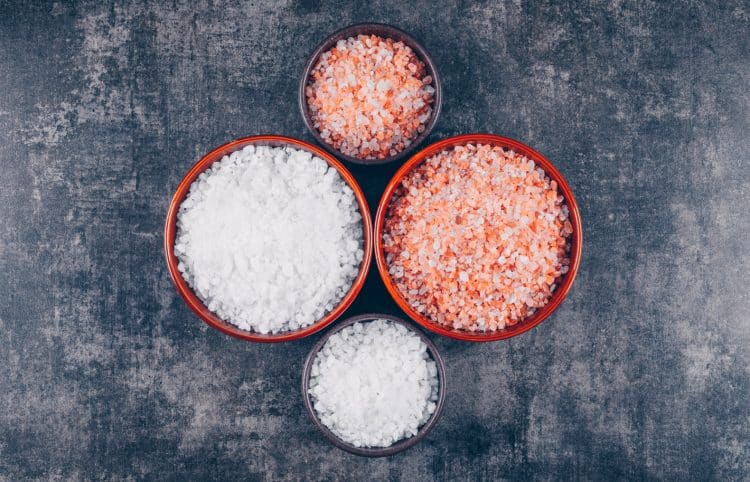What is Salt?
Salt, also known as sodium chloride (NaCl), contains approximately 40% sodium and 60% chloride [1]. Sodium is an essential nutrient, meaning that your body can not produce it on its own, and it needs to be consumed through diet and that it is needed for the body to function [2]. Sodium is essential for maintaining acid-base balance, plasma volume, cellular functioning, nutrient transportation, muscle function, fluid homeostasis, and nerve function [2, 3, 4, 5].
In the United States, the majority of people can get enough sodium through food to maintain body function [2, 3]. In fact, most people consume an excessive amount of sodium [2, 6, 7]. Dietary sodium is found in processed foods, such as lunch meats, cheeses, snack foods, bullion, condiments, and table salt [2]. It is also naturally found in foods such as meat, shellfish, and milk [2].

The USDA’s 2020-2025 Dietary Guidelines for Americans currently recommends that adults should limit their sodium to 2,300 milligrams per day (about one teaspoon of table salt) [6]. In contrast, the American Heart Association recommends that adults should limit their sodium to 1,500 milligrams per day due to the risks associated with consuming an excess amount of sodium, such as high blood pressure [2, 7]. However, the body only needs about 500 milligrams of sodium per day to maintain bodily functions [1, 4].
Does Salt Break A Fast?
Whether or not consuming salt will break your fast depends on the type of fasting you are doing. If you are fasting for religious reasons, depending on the fasting guidelines, eating salt may break your fast. However, if you are fasting as a form of diet, such as intermittent fasting or fasting for weight loss, then consuming salt would not be considered to break your fast. Salt does not contain calories or carbohydrates, so it does not cause an insulin response.
Limiting the body’s insulin response is often the goal of intermittent fasting or fasting for weight loss [8]. As insulin levels drop during a fast, our bodies switch from burning glucose for fuel to burning fat for fuel, resulting in weight loss [8]. Salt does not affect this process, so it will not break your fast.
Do I Need to Supplement Salt When I Fast?
Since sodium is an essential nutrient for bodily function, you may be wondering if you need to supplement salt when you fast.

When you begin fasting, the kidneys begin excreting sodium, which is a factor in the rapid weight loss experienced during the first week of a fast [9]. Studies have shown on the second day of a fast, the body has a negative sodium balance, and by the third day, an average of 1,564 milligrams of sodium are lost [9, 10]. Over a 7-day fasting period, about 7,475 milligrams of sodium are lost [9]. However, the peak sodium loss occurred around day three [9]. The reason that sodium loss does not continue to increase after day three, and begins to stabilize, is that once the body reaches the phase of early starvation, it begins to produce ammonium to conserve sodium [9, 10].
Since the body naturally begins to conserve sodium, there is not an imminent need to supplement sodium when fasting. Sodium deficiency is rare [1]. However, a sodium deficiency can occur if the body has unbalanced electrolytes due to vomiting, diarrhea, or drinking an excessive amount of fluids [1]. Symptoms of very low sodium, or hyponatremia, include nausea, headaches, vomiting, confusion, seizures, and even coma [3, 4].
If you are fasting and want to make sure that you do not lose too much sodium, you can do a serum sodium blood test while you are fasting to determine whether you should supplement sodium or not [3]. Even though the Dietary Guidelines for Americans suggest limiting sodium to 2,300 milligrams a day, the body only needs 500 milligrams of sodium a day to maintain bodily function [4, 6]. 500 milligrams of salt is equal to ¼ teaspoon of salt, depending on the type of salt. If supplementing, ¼ teaspoon of salt could be added to a glass of water.
Types of Salt
If you decide to supplement salt when fasting, you may be wondering which type of salt would be best. Let’s review each type of salt and its nutritional benefits.

Table Salt
Table salt is the most popular salt used in the United States [1]. It is heavily processed and refined to remove impurities [1]. The refinement process may also remove trace minerals. Iodine is added to table salt to prevent medical conditions that are caused by iodine deficiency, such as goiter and hypothyroidism [1].
Table Salt Trace Minerals [11]:
- Sodium – 39.1%
- Calcium – 0.03%
- Potassium – 0.09%
- Magnesium – <0.01%
- Iron – <0.01%
Kosher Salt
Kosher salt is a flakey, coarse salt that was traditionally used in Kosher food preparation [1]. Kosher salt does not contain any iodine additives [1]. It is mined directly from salt deposits and is 100% sodium chloride [11].
Kosher Salt Trace Minerals [11]:
- 100% pure sodium chloride. No trace minerals.
Sea Salt
Sea salt is produced from evaporating seawater [1]. It is not a refined form of salt [1]. Sea salt is mainly composed of sodium chloride, but trace minerals can also be found [1].
Sea Salt (Celtic) Trace Minerals [11]:
- Sodium – 33.8%
- Calcium – 0.17%
- Potassium – 0.16%
- Magnesium – 0.30%
- Iron – 0.014%
Himalayan Pink Salt
Himalayan pink salt is mined in the hills of Pakistan [1]. It is unrefined and contains trace amounts of minerals [1].
Himalayan Pink Salt Trace Minerals [11]:
- Sodium – 36.8%
- Calcium – 0.16%
- Potassium – Potassium 0.28%
- Magnesium – 0.10%
- Iron – <0.01%
Which Type of Salt is the Healthiest?
Currently, no form of salt is ranked the healthiest, even though some contain more trace minerals than others [12]. Picking the best salt based on its trace mineral content would also not be of any benefit since you would have to consume a considerable amount of salt to gain any benefits from the trace minerals, which would also result in consuming dangerous levels of sodium [12]. Since no form of salt is the healthiest, you can pick the type of salt you prefer.
FAQ
Can I eat salt during fasting?
Yes. Salt does not contain any calories or carbohydrates, so eating salt will not break your fast.
Can I eat salt during intermittent fasting?
Yes. You can eat salt while intermittent fasting. Salt is mainly composed of sodium chloride and will not cause your body to exit its fasting state.
Does salt spike insulin?
No, salt does not spike insulin. Insulin spikes are caused by carbohydrates which are broken down into sugars.
Does salt knock you out of ketosis?
No, consuming salt does not knock you out of ketosis since it does not cause a spike in insulin.
Wrapping Up
Sodium may get a bad rep for causing high blood pressure, but it is an essential nutrient that the body needs to maintain its function [2, 3, 4, 5]. Salt itself does not break a fast, and since it is an essential nutrient, you may still be wondering if you need to supplement salt when you fast. The best thing to do would be to discuss your fast and salt supplementation with your doctor. They can order you a serum sodium blood test to see if you are sodium deficient. Your doctor will also be able to review your health history to determine if you are at risk for high blood pressure or kidney disease. If at risk, salt supplementation should be avoided.
Learn more about fasting
- 11 Best Intermittent Fasting Books in 2023 (Review and Ranked)
- 7 Day Water Fast: Your Journey to Rejuvenation and Wellness
- 6 Intermittent Fasting Juice Recipes: Sip Your Way to Success with These Tasty Recipes!
- Eat Stop Eat Intermittent Fasting Decoded: Master Your Metabolism & Lose Weight
- Intermittent Fasting for Weight Loss in Men — The Ultimate Guide
- Fat Loss vs. Weight Loss — Explained!
- Fruit Fasting: The Sweet Path to Wellness
- Foods To Avoid While Intermittent Fasting
References
- Harvard School of Public Health. Salt and Sodium. (2022, September 15). The Nutrition Source. https://www.hsph.harvard.edu/nutritionsource/salt-and-sodium/
- World Health Organization. Salt reduction. (2020, April 29). https://www.who.int/news-room/fact-sheets/detail/salt-reduction
- MedlinePlus. Sodium. (n.d.). https://medlineplus.gov/sodium.html
- Farquhar, W. B., Edwards, D. G., Jurkovitz, C. T., & Weintraub, W. S. (2015). Dietary Sodium and Health. Journal of the American College of Cardiology, 65(10), 1042–1050. https://doi.org/10.1016/j.jacc.2014.12.039
- Pearson, K., PhD. (2017, May 16). Is Pink Himalayan Salt Better Than Regular Salt? Healthline.
- USDA. (2020). 2020-2025 Dietary Guidelines for Americans. https://www.dietaryguidelines.gov/sites/default/files/2021-03/Dietary_Guidelines_for_Americans-2020-2025.pdf
- American Heart Association. 7 Salty Sodium Myths Busted Infographic. (n.d.). https://www.heart.org/en/healthy-living/healthy-eating/eat-smart/sodium/7-salty-sodium-myths-busted-infographic
- Harvard Health. (2021, February 28). Intermittent fasting: The positive news continues. https://www.health.harvard.edu/blog/intermittent-fasting-surprising-update-2018062914156
- Kerndt, P. R., Naughton, J. L., Driscoll, C. E., & Loxterkamp, D. A. (1982). Fasting: the history, pathophysiology and complications. The Western journal of medicine, 137(5), 379–399.
- BOULTER, P. R., SPARK, R. F., & ARKY, R. A. (1974). Dissociation of the Renin–Aldosterone System and Refractoriness to the Sodium-Retaining Action of Mineralocorticoid During Starvation in Man. The Journal of Clinical Endocrinology &Amp; Metabolism, 38(2), 248–254. https://doi.org/10.1210/jcem-38-2-248
- Link, M. R. S. (2021, December 15). Kosher Salt: What It Is, Vs. Other Types of Salt, and More. Healthline.
- Fayet-Moore, F., Wibisono, C., Carr, P., Duve, E., Petocz, P., Lancaster, G., McMillan, J., Marshall, S., & Blumfield, M. (2020). An Analysis of the Mineral Composition of Pink Salt Available in Australia. Foods, 9(10), 1490. https://doi.org/10.3390/foods9101490


